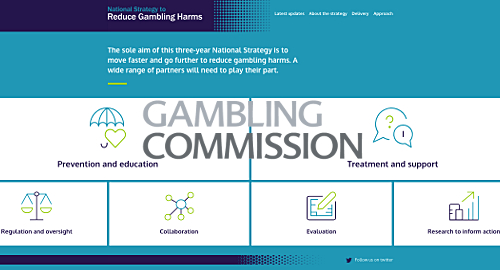 The UK government has unveiled its new three-year strategy for reducing the potential harms of gambling that will include a “firm regulatory enforcement approach” toward gambling operators.
The UK government has unveiled its new three-year strategy for reducing the potential harms of gambling that will include a “firm regulatory enforcement approach” toward gambling operators.
On Thursday, the UK Gambling Commission (UKGC) released its new National Strategy to Reduce Gambling Harms, a three-year program involving health bodies, charities, regulators and businesses that will focus on two main areas: prevention and education, and treatment and support.
UKGC chairman William Moyes said the new strategy will allow the government and its partners “the opportunity to make faster progress to reduce gambling harms,” not only for those directly impacted by gambling but also their friends, family and society at large.
Last year, the UKGC released a report detailing its ‘framework for action’ on measuring gambling-related harms, which aimed to assist the government and gambling charities in determining how best to allocate their resources in the fight to better protect consumers.
Much of the new strategy is based on conducting still more research into the effects of gambling. The UKGC says it will “explore the establishment” of a new National Research Center, while Public Health England will conduct the first ever review of evidence on the public health harms in England relating to gambling. Consumers will be able to track all this research-gathering via a new website, Reducinggamblingharms.org.
Mims Davies, Minister for Sports and Civil Society, gave a speech saying the new strategy reflected the changes in technology, consumer behavior and attitudes toward gambling that have transpired since the last harm-reduction strategy was released in 2016.
Davies said some of these changes have “increased concern about what the future of the gambling industry may hold” and, while the government didn’t want to stop people “having fun,” it was attempting to strike “the right balance between freedom and protections.”
Davies broke with the UKGC’s Moyes by claiming that the currently voluntary financial contributions by operators to problem gambling programs are “capable of delivering sustainable funding to meet the increased targets,” singling out GVC Holdings for pledging to contribute 1% of its gross gaming yield. However, Davies warned that “if it turns out that the voluntary system is not capable of meeting current and future needs, we will look at alternatives. Everything is on the table.”
In January, the UK government announced that it would build more dedicated facilities for treating problem gamblers as part of its revamp of the National Health Service.